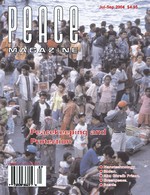
Peace Magazine Jul-Sep 2004, page 5. Some rights reserved.
Search for other articles by various here
All governments and political wannabes -- and us regular folk -- should consider the following pertinent question: What good is creating or preserving businesses and jobs when people are sick, dying or already dead due to environmental degradation?
One theory floating out there, but not readily known (and not necessarily adopted by me), is that of "The Quickening": Quite like the human body's immune system, Earth is an organic form that will purge itself of the humanity virus through Earth's immune system -- e.g., HIV/AIDS, which some experts believe was released from the ground during the human destruction of southern-hemisphere rain forests.
Frank G. Sterle, Jr., White Rock, BC
I was pleased to see "Working for Human Rights in Guatemala" (by Aaron Bates, Jul/Sep 2003) as I believe it is essential to keep the situation in Central America before Canadians. The article mentions the policy of Arbenz to nationalize land and distribute it to small farmers. A book I read recently refers to this, but in a slightly different way.
A friend loaned me a book called Guatemala, A Cry from the Heart by V. David Schwantes who was a business man, conservative and an active Republican. His book published in 1990, was the result of travelling in Guatemala with a group interested in getting close to the people and finding out what was really happening.
In the book there is reference to the democratic election of Arbenz who realized the need for land reform. He proposed expropriating idle lands and compensating the owners for the value they had claimed for the land when they paid their real estate taxes. The landowners, including the United Fruit Company, opposed this, and Arbenz was overthrown by the U.S. through the efforts of the CIA. It is interesting that the U.S. wants to bring democracy to countries like Iraq, but has consistently supported military regimes in Central America.
The Guatemalan Bishops Conference writes in a 1988 pastoral letter (quoted in Schwantes' book). "... the majority of arable land is in the hands of a privileged few, while the majority of campesinos own no plot of land on which to sow their crops."
"During what has been called the second revolutionary government (1950-1954), a careful agrarian reform process was begun which, although flawed, has been the only serious attempt to modify an unjust structure. We all know the reaction which this produced among its detractors and how it was abruptly ended."
Tom Beattie, Richmond Hill, ON
While we may continue to celebrate the collapse of totalitarian communism, we should pause to reassess the consequent wishful thinking that the world is better off now that the United States is the sole superpower on the planet.
While we should be concerned that the hegemonic practices of the United States will work against the nation in the long run, spurring the reemergence of powerful nations such as Germany, Japan, China, and Russia and of alliances among them, the problem lies with U.S. hegemony and not with these other nations. Simply, it would be good for the U.S. and for the world if any of these nations, individually or collectively, could become powerful enough to challenge the United States to be less aggressive--in other words, we need these countries to contain the U.S.
This may be the case with the European Union. As the philosopher Richard Rorty suggests in the Fall 2003 issue of Dissent, the possible emergence of the European Union into "a powerful independent force in world affairs" should be viewed "not as an expression of resentful anti-Americanism but as entirely appropriate and altogether welcome reaction to the danger that the direction of American foreign policy poses for the world." Such a view is not "un-American." When the parent of a school bully takes action to neutralize the damage caused by his or her child, we do not say that the parent is betraying the child. On the contrary, the parent of that anti-social child and, indeed, all of us have a responsibility to prevent harm.
In contrast to the policies of the Bush Administration, we need learn to treat people decently by affirming their individual humanity. This goal has been well served by the Civil Rights movement and by the collapse of the totalitarian state. But we are more than individuals.
People need substance--clean food and water, shelter, a toxin-free environment, and health care. Outside of a few small and privileged communities, most people on the planet do not enjoy this substance. Substantive equality, not military supremacy by one hegemonic nation, is key to peace and security in the twenty-first century.
Omar Swartz PhD, University of Colorado, Denver

Peace Magazine Jul-Sep 2004, page 5. Some rights reserved.
Search for other articles by various here